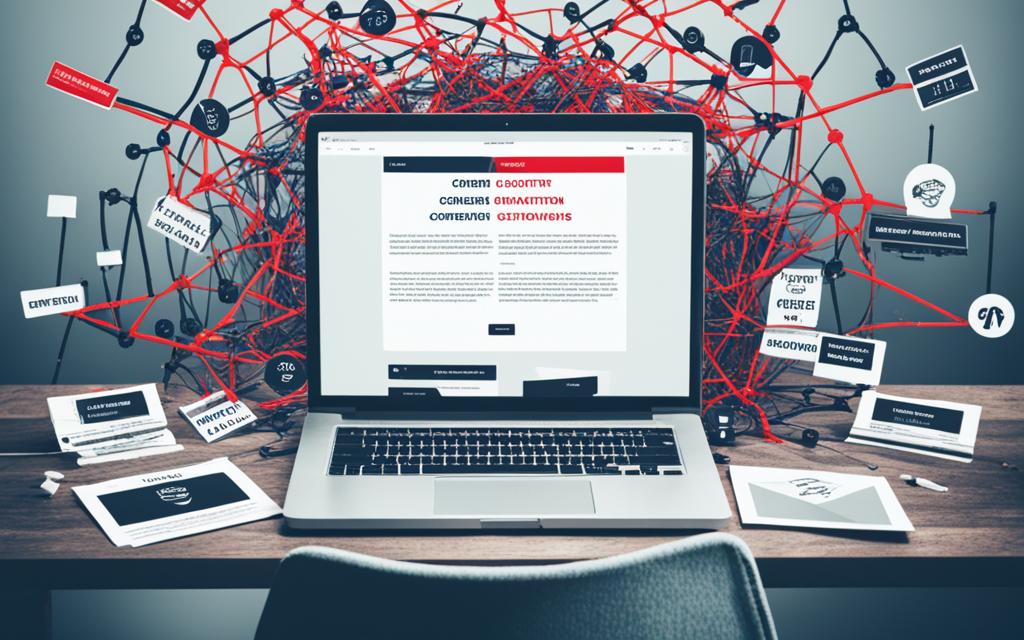Welcome to our article on the lessons learned from major online reputation crises. In this section, we will provide an overview of notable crises that have occurred in the past and delve into the impact these incidents can have on a brand’s image and reputation.
Over the years, numerous renowned companies have faced online reputation crises that have shaken their foundations and left lasting impressions on their audiences. From social media scandals to data breaches, these incidents have demonstrated the power and influence of the digital realm.
These crises have proven that in the digital age, maintaining a positive online reputation is crucial to the success and longevity of a brand. The impact on brand image can be far-reaching, affecting consumer trust, customer loyalty, and even financial performance. Thus, it is important to understand the lessons learned from these major incidents and take proactive steps to protect and enhance your online reputation.
In the upcoming sections, we will explore common mistakes to avoid when managing online reputation, discuss effective recovery strategies, and delve into the long-term consequences of reputation crises. Additionally, we will provide insights on how to prepare for future crises, ensuring your brand is resilient and well-equipped to navigate any challenges that may arise.
By learning from past experiences and implementing the right strategies, you can safeguard your brand’s reputation and maintain a positive online presence. Let’s begin this insightful journey into understanding the lessons learned from major online reputation crises.
Common Mistakes to Avoid
When faced with an online reputation crisis, companies often make critical mistakes that can exacerbate the situation rather than resolve it. In this section, we will outline some of the common errors to be avoided, while highlighting the importance of timely response and transparency to safeguard your brand’s reputation.
One of the most significant mistakes companies make during a reputation crisis is failing to respond promptly. Delaying your response can give the impression of indifference or negligence, leading to further damage to your brand’s image.
An immediate response is vital in showing your audience that you take their concerns seriously. It demonstrates your commitment to resolving any issues and rebuilding trust with your customers. Incorporating a defined crisis management protocol that includes designated individuals responsible for monitoring and addressing online reputation issues can significantly contribute to an effective and timely response.
- Ignoring negative feedback: It’s crucial to address negative sentiments and feedback promptly. Ignoring or dismissing these comments can lead to a reputation crisis escalating beyond control. Engage with your audience, acknowledge their concerns, and offer sincere apologies or solutions where necessary.
- Lack of transparency: Transparency is key when dealing with an online reputation crisis. Be open and honest with your customers, providing them with all relevant information without withholding crucial details. Transparent communication builds credibility and helps in rebuilding trust.
- Deleting or hiding negative comments: Instead of erasing negative comments or reviews, use them as an opportunity to showcase your commitment to resolving customer issues. Responding thoughtfully and respectfully to negative feedback demonstrates your willingness to address concerns and improve your products or services.
- Engaging in online arguments: Engaging in heated arguments or public disputes online can damage your reputation further. It is essential to maintain a professional and composed tone when responding to criticisms, addressing concerns, or resolving conflicts.
- Underestimating the power of social media: Social media platforms have a vast reach and can amplify the impact of a reputation crisis. Ignoring or underestimating the influence of these platforms can lead to severe consequences for your brand. Monitor social media channels closely and proactively address issues as they arise.
The image below underscores the significance of timely response and transparency in managing online reputation crises:
| Common Mistakes | Solutions |
|---|---|
| Delaying response | Implement a crisis management protocol for prompt action |
| Ignoring negative feedback | Engage with customers, apologize, and offer solutions |
| Lack of transparency | Be open, honest, and provide all relevant information |
| Deleting or hiding negative comments | Respond thoughtfully and use criticism as an opportunity for improvement |
| Engaging in online arguments | Maintain a professional and composed tone |
| Underestimating the power of social media | Monitor social media closely and proactively address issues |
Effective Recovery Strategies
After experiencing a major online reputation crisis, it is crucial for businesses to implement effective recovery strategies to rebuild trust with their customers and stakeholders. In this section, we will explore successful turnaround stories and reveal key takeaways that you can apply to your own brand.
One of the most important steps in the recovery process is acknowledging the issue and taking responsibility for any mistakes made. By demonstrating transparency and authenticity, you can begin to rebuild public trust. This involves issuing a sincere apology, providing an explanation of what went wrong, and outlining the steps you are taking to prevent similar incidents in the future.
Communication is a vital component of an effective recovery strategy. You need to proactively engage with your audience and address their concerns. This can be done through various channels, such as social media, press releases, and direct outreach to key stakeholders. By actively listening and responding to feedback, you have the opportunity to rebuild relationships and demonstrate your commitment to improving.
Remember, successful recovery from an online reputation crisis is not just about fixing the immediate damage. It’s about creating a long-term plan to prevent future crises and regain the trust of your audience.
Another crucial aspect of the recovery process is rebuilding brand credibility. This involves showcasing your expertise, highlighting positive customer experiences, and leveraging influencers or industry experts to vouch for your brand. By consistently delivering high-quality products or services and exceeding customer expectations, you can gradually rebuild your reputation.
Monitoring and managing your online presence is paramount during the recovery phase. Regularly monitor mentions of your brand on social media and other online platforms to promptly address any negative sentiment or misinformation. Additionally, actively engage with your audience by responding to reviews and comments, both positive and negative, to demonstrate your commitment to customer satisfaction.
Lastly, learn from successful turnaround stories of other brands. Study how they navigated through their crises and identify key strategies that can be applied to your own situation. By analyzing these stories, you can gain valuable insights and adapt them to your unique circumstances.
Key Takeaways
- Take responsibility for mistakes and communicate transparently with your audience.
- Proactively address concerns and actively listen to feedback.
- Rebuild brand credibility through expertise and positive customer experiences.
- Monitor and manage your online presence to promptly address issues.
- Learn from successful turnaround stories and adapt strategies to your own brand.
Long-Term Consequences and Preparing for Future Crises
When it comes to online reputation crises, the immediate impact on your brand’s image and bottom line is often the primary concern. However, it’s crucial to recognize that these crises can have long-term consequences that extend far beyond the initial fallout. Failing to address these long-term consequences can significantly impact your business’s growth and reputation in the future.
One of the most significant long-term consequences of an online reputation crisis is the erosion of trust among your customers and stakeholders. Negative news or reviews can leave a lasting impression that is hard to shake off. Potential customers may hesitate to engage with your brand, and existing customers may consider switching to a competitor. It’s essential to address the trust deficit head-on and take proactive steps to rebuild trust with your audience.
Another long-term consequence is the damage to your brand’s search engine rankings. Negative content associated with your brand can rank highly in search engine results, undermining your online visibility and making it harder for potential customers to find positive information about your brand. Implementing effective search engine optimization (SEO) strategies and creating high-quality, positive content can help mitigate this issue and restore your brand’s online visibility.
Preparing for future crises is paramount in protecting your online reputation. By establishing robust crisis management processes, you can effectively respond to and mitigate the impact of potential reputation-damaging events. This involves developing a crisis communication plan, monitoring online conversations about your brand, and swiftly addressing any issues that arise.
It’s also essential to proactively build a positive online presence by engaging with your audience through various digital channels. Sharing valuable content, responding to customer feedback, and actively managing your online reputation can help establish a strong foundation that can withstand future crises.
In conclusion, understanding and addressing the long-term consequences of online reputation crises is vital for the sustained success of your business. By focusing on rebuilding trust, improving search engine rankings, and preparing for future challenges, you can protect your brand’s reputation and secure a positive future.
Conclusion
In conclusion, the lessons learned from major online reputation crises emphasize the vital role of protecting and managing your brand’s reputation in the digital age. Your online reputation can significantly impact your business’s success, and it is crucial to avoid common mistakes that can lead to reputation damage.
Effective recovery strategies, such as addressing issues promptly, transparently, and authentically, can help rebuild trust and restore your brand’s reputation. However, it is equally essential to be prepared for future crises by implementing proactive measures to monitor and manage your online presence.
Remember that building a positive online reputation takes time and effort. Consistently delivering excellent products, services, and customer experiences will contribute to a strong reputation. Additionally, engaging with your audience, responding to feedback, and actively managing your online platforms will help safeguard your brand against potential reputation crises.
By learning from past mistakes, implementing effective recovery strategies, and proactively managing your online reputation, you can navigate through challenging times and emerge with a resilient and positive brand image. Your online reputation is a valuable asset that deserves protection and nurturing to ensure long-term success.







